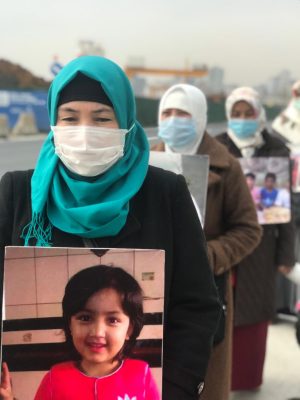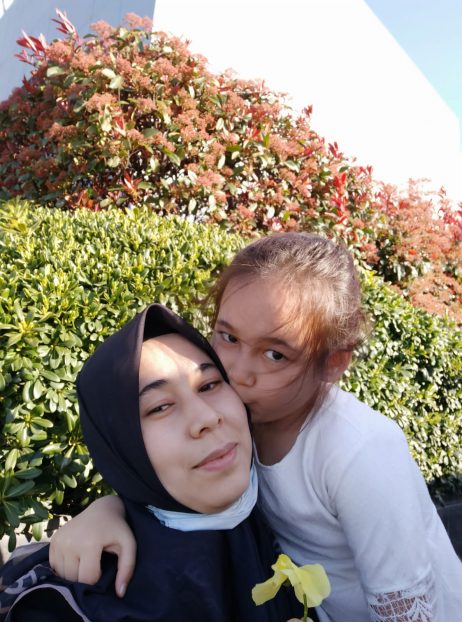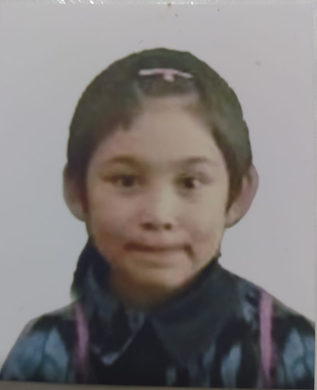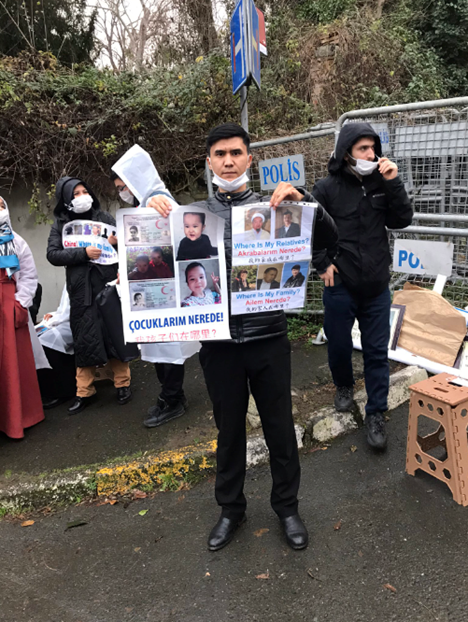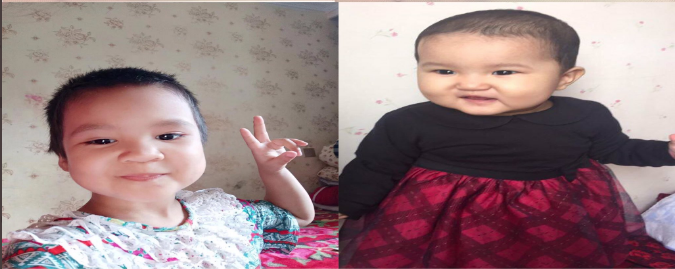Maryem Abdulhamid, 47, is a mother of four children. She fled Xinjiang and came to Istanbul in 2016 with only two of her children at the time. Abdulhamid was pregnant with her fourth child when she decided to leave Xinjiang, fearing that she would be persecuted by Chinese authorities for having another child. Abdulhamid’s third daughter, Rizwangul, was just 12 years old the last time she saw her and was left in the care of her husband back in 2016.
“The main reason that we could not take my daughter to Turkey was because she was not given a passport at the time,” Abdulhamid said. “We have never committed any crimes or never had a criminal record and we were positive that now that she had her Turkish passport they would let me reunite with her and her siblings but they [the Chinese authorities] have not done this for the last four years.”
The last time she spoke to her daughter Rizwangul was on a brief phone call in 2017, when she managed to get through to their family cell phone. Abdulhamid described her daughter’s words as being, “Where is my father? I am alone here with no one to look after me.”
It was later discovered through relatives that Abdulhamid’s husband has been taken to a concentration camp in Xinjiang, leaving her daughter with no one to look after her. The reason for his arrest? He had helped his wife and two children go to Istanbul and was being punished unjustly for that.
Abdulhamid’s daughter told her mother, “Other relatives were not able to look after me due to the government’s involvement and strict surveillance. Please help me.”
That was last time that she heard her daughter’s fearful voice; Abdulhamid has not been able to contact her since. It has now been four years and she still dreams of one day reuniting with her daughter.
An estimated 1.5 million Uyghurs have been detained in concentration camps, separated from their loved ones. Others have escaped but had to leave family members behind, including young children. Many of their stories are similar to Abdulhamid’s: they were able to travel abroad during a brief window of opportunity in 2016, but couldn’t get passports for their children immediately. They left China, thinking they would arrange the paperwork and reunite their families. But the window slammed shut, and now many mothers and fathers have no idea where their children are today, or who is taking care of them.
Abdulhamid and a group of Uyghur mothers got together on International Women’s Day in March and walked for two weeks from Istanbul to Ankara to peacefully protest outside the United Nations office. She also contacted the Chinese Embassy but had been told they could not do anything for her.
She cried as she asked me: “Where is the justice in this world?”
“I can’t describe in words how I feel as a mother who is not even able to see my daughter. I have been so heartbroken as the children who are with me are not only forcibly separated from their father but also their sister. My youngest child has never even seen her father before.”
Abdulhamid broke down and took a moment to collect herself before saying, “I would have committed suicide if it wasn’t for my faith in God and children who are with me. My heart aches, it is unbearable thinking that my child is not here with me and I cannot get her back.”
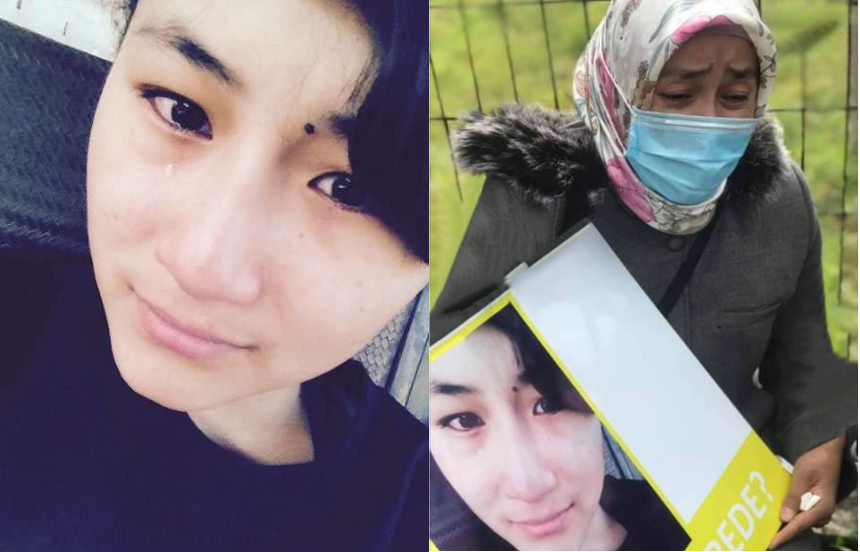
Left: Maryem Abdulhamid’s daughter Rizwangul, age 12. Right: Maryem Abdulhamid holds a photo of her daughter during a protest in Ankara. Photos courtesy of Maryem Abdulhamid.
Abdulhamid describes not being able to sleep a single night since she has been away from her daughter and the devastating mental impact it has had on her life. “I have been suicidal for years and years thinking about the injustice,” she said. “There is no sadness that can be compared to a parent who loses a child.”
The emotional heartache that Abdulhamid is experiencing has heightened in recent days after feeling that her voice, and those of other Uyghur parents, has gone unheard.
“I would rather my child would not be alive than be under the oppression of China. No mother would ever want their child to not be alive, but our suffering has been so severe that I cannot bear the thought of my daughter suffering, alone or in a concentration camp.”
“Some of the other mothers I know have seen their children on a Chinese social media site crying and looking sad,” she added. “It is affecting them mentally seeing this because they cannot reach out and hug them, they cannot tell them that they are still alive and that they have a mother who so desperately wants to reunite with them.”
Maimatimin Buweiamina, 30, has a similar lived experience. In her first time speaking to the media, she told The Diplomat that she has had enough of being silent and wants to speak out in the hope that she could one day reunite with her children.
“I have five children, but three of them are missing in Xinjiang and two of them are with me,” she said.
Her story begins with a visit to Turkey back in 2016, a time when she said the Chinese government had eased its policies on issuing passports to the Uyghur community.
Buweiamina described how she was unable to bring three of her children, who were aged four, six, and eight, to Turkey as she was unable to get passports for them in time. She left them with elderly relatives. After a week in Turkey her husband decided to go back to Xinjiang to see if he could get passports for their three other children, but he was arrested at the airport and imprisoned for 15 years for the supposed crime of traveling abroad.
Buweiamina said she hasn’t been able to get in contact with her three children or any of her family members in Xinjiang since her husband was detained.
“Until now we haven’t spoken about our plight because we had a hope that we would be reunited as a family, as we thought the Chinese government would eventually allow us to reunite, but that hasn’t happened.”
She has fond memories of the time spent with her children and tearfully showed me a photo of one of her children, her daughter Fetime.
“I can’t describe how much pain I am in. I haven’t seen my three children for five years. Where is the humanity? All us mothers wonder whether the rest of the world understands the severity of our situation,” Buweiamina said.
“What would it take for people to act – do we have to kill ourselves? I would rather die for my children than go through this suffering. I have never seen my children, not even on Chinese state social media, since we lost contact. I don’t know what has happened to them or what their situation is and that is what’s killing me the most.”
She broke down as she added: “I don’t know if my children are dead or alive.”
Sudanisa Abdulhamit, 42, is a Uyghur mother of seven who fled Xinjiang. She reveals that the crackdown against Uyghur Muslims was being felt as far back as 2014, when her own husband was imprisoned for being an imam who was teaching the Quran at a mosque in Xinjiang.
He then was released in 2015 and managed to get a passport and went to Saudi Arabia for the holy pilgrimage of Hajj. At the end of 2015 Abdulhamit obtained her own passport and left three of her children in the care of her eldest daughter, who was married and lived in southern Xinjiang, so that she could perform a holy pilgrimage to Saudi Arabia. Afterward, Abdulhamit planned to go to Istanbul and bring her all of her children there due to the growing crackdown against Muslims in China.
However, things took a turn for the worse in 2017, when she wasn’t able to get through to her children. She received a letter from her daughter, which had been passed through to her from her brother-in-law, saying that her daughter’s husband had been sentenced to 15 years in prison, along with 20 Muslim students, and put into a concentration camp because they were reading and learning the Quran. In the letter, her daughter had advised her not to ever come back to Xinjiang or she could be arrested.
“My daughter mentioned that one of my sons had been wondering the streets looking for me and that broke my heart,” Abdulhamit remembered.
“As a mum I have almost gone crazy thinking about them, I call out their names longing to hear their voices speak back to me.”
In May 2018, her husband traveled from Istanbul to Saudi Arabia for the holy pilgrimage to pray to be reunited with their children. But three days before he was about to leave, he was arrested and sent back to China.
Abdulhamit is now left as a single mother to look after three of her children, without knowing what has happened to her husband or her other four children back in Xinjiang.
Buzuhra Mamatkurban, 40, had never spoken to the media before but now wants to reveal her story. She used to run a private hospital with her husband in Kashgar and had four children. When she came to Turkey with two of her children she was unable to get passports in time for her remaining two children and left them in Xinjiang with elderly relatives.
Her husband, Muhammad Kurban, went back to Xinjiang to get their other two children but his passport was confiscated at the airport. She later found out that her husband was taken to a concentration camp. Since then she has not heard anything from her husband or the whereabouts of her other two children.
In addition, Mamatkurban says that her 80-year-old father and her sister had their passports confiscated when they returned to China after a visit to Turkey and were both put into concentration camps.
“I have always been worried that my children might be looking for me and my husband as he was taken to the concentration camps. I would die just to be able to hold them again for even a minute,” Mamatkurban said.
“All I want to do is give my missing children motherly love that they haven’t been able to have for all these years. I just can’t describe how difficult this separation feels as a mother.”
Kalbinur Turson, 38, had a similar plight when she came to Turkey in 2016 to give birth in Istanbul, entrusting five of her children to the care of relatives. Kalbinur is a mother of seven but has not had contact with her husband and five of her children for several years. One of her children drowned in 2014, at age 13, but due to China’s crackdown on Uyghurs having more than two children, she was unable even to claim his body. As a Muslim woman, she knew she would be heavily reprimanded for having too many children.
After a week of being in Turkey, her husband decided that he would go back to China to arrange passports for her other children. He managed to get passports for all his children, but three days before flying to Turkey he was arrested on the streets by Chinese authorities.
In 2016, Turson managed to speak to her sister in her home village of Kashgar and expressed the desire to come back and get her five kids. But her sister said, “Don’t ever come or you will be arrested.” Since then, she hasn’t had any contact with her children or husband.
Last year, Turson was shocked to see her daughter Ayeshe, then six years of age, in a video on Chinese social media. She said that the video had been posted by a teacher at a school in Hotan.
“When I saw Ayeshe in the video I recognized her straight away and was glad to know that at least one of my children is alive. I am worried that the authorities are bringing her up and I cannot stop thinking about it. I will never give up in trying to reunite with my children.”
Omer Faruh was in Saudi Arabia in 2016 when his wife called him from China, saying that Chinese police were demanding her to surrender the passports for her and their children. Faruh advised his wife not to give up their passports as he knew the next step might be that they would be taken to internment camps against their will.
He immediately arranged for flights out of China for his wife and two elder daughters, who already had passports, but was unable to bring his younger children, who were toddlers at the time. Faruh had to leave them with his in-laws. In 2017 he found out that his in-laws had been placed in internment camps and has been unable to get any information on his children since. He now regularly protests in Istanbul outside the Chinese Consulate and calls on them to reunite him with his children.
“I just want to reunite with my children. They have got Turkish citizenship now and they should be allowed to be with me and my wife and their other sisters. I haven’t heard from any of my family members since they have been taken to concentration camps,” Faruh said.
Faruh managed to get Turkish passports for his younger children, but Chinese authorities ignored his ongoing pleas to bring his children back.
“I can’t even speak to my children or even see them or hear their voice and that is something that is unbearable for me.”
His wife has had trouble sleeping for years and has regular nightmares.
Another Uyghur father, Ahmed Talib (name changed at his request) said he had left two of his children in a secret location in China with a Chinese friend after fleeing Xinjiang with his wife and two other children. But now he has lost contact and fears for the safety of his children. “If all us Uyghur parents continue to remain silent we will never be reunited with our loved ones again,” Talib said.
These brave Uyghur parents who have decided to speak out have only one wish: to see their families reunited. They would even put their lives on the line in the hope that some action would be taken. It is now up to the international community and those in power to act if Uyghur Muslims have any hope of ever reuniting with their loved ones again.













